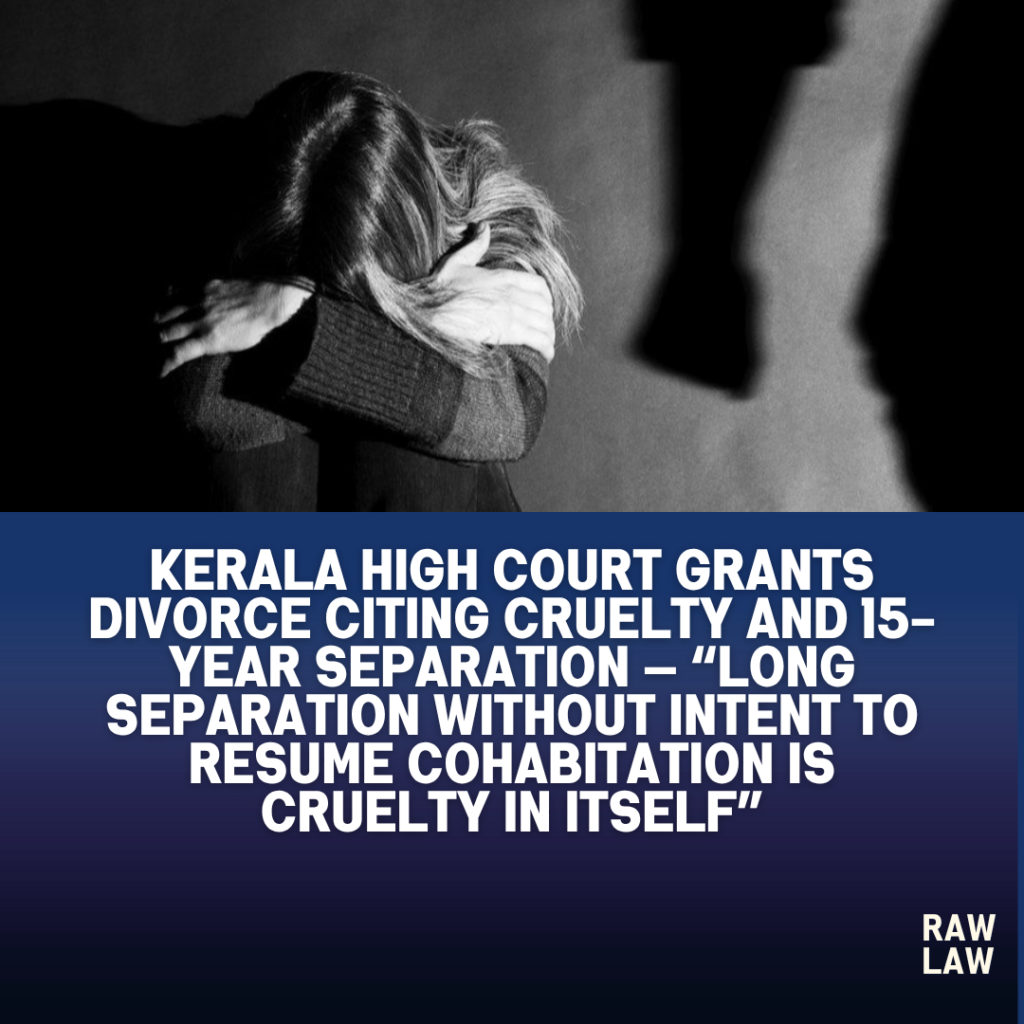Court’s Decision
The Kerala High Court allowed the appeal in Mat. Appeal No.1127 of 2016, setting aside the Family Court’s order which had denied the husband a decree of divorce under Sections 13(1)(ia) and 13(1)(ib) of the Hindu Marriage Act, 1955. The Division Bench comprising Justices Sathish Ninan and P. Krishna Kumar held that the husband had been subjected to mental cruelty and desertion and observed:
“The adverse findings of the trial court lack factual foundation… Long separation without any intention to resume cohabitation amounts to cruelty to the spouse.”
The Court dissolved the marriage by decree of divorce.
Facts
The marriage between the parties was solemnized on 01.05.1996. They have a daughter. The husband, working with LIC, alleged cruelty and desertion by his wife, who was an Assistant Manager at KSFE. He claimed she repeatedly insulted him, refused conjugal relations post childbirth, and eventually left the matrimonial home in May 2010 with the child. He filed for divorce after efforts for reconciliation failed. The wife contested the petition alleging her husband was an inebriate who harassed her for dowry and expelled her from the house.
Issues
- Whether the husband had established cruelty and desertion under Sections 13(1)(ia) and 13(1)(ib) of the Hindu Marriage Act?
- Whether the marriage had irretrievably broken down?
- Whether the Family Court’s rejection of the divorce petition was legally sustainable?
Petitioner’s Arguments
The husband contended that the wife had denied him conjugal rights and humiliated him regularly. She left the matrimonial home in May 2010 and had shown no intention to return. He emphasized the emotional and psychological trauma caused by her indifference and claimed the marriage had irretrievably broken down after 15 years of separation.
Respondent’s Arguments
The wife asserted that she had fulfilled her marital duties and never refused conjugal relations. She alleged the husband was abusive and had misappropriated her property. She also stated he expelled her from their home. However, in cross-examination, she admitted several claims in her written objection were false, including the dowry allegation and denial of sexual relations.
Analysis of the Law
The Court examined the evidence of both parties, including their affidavits and cross-examinations. It found the wife’s testimony unreliable and inconsistent. The Court reiterated that false allegations, even when later withdrawn, amount to mental cruelty.
The long period of separation—15 years—with no action from the wife for restitution of conjugal rights, also supported the claim of desertion. The High Court underscored that a marriage without mutual affection and cohabitation becomes an emotional burden.
Precedent Analysis
The Court referred to the following decisions:
- Samar Ghosh v. Jaya Ghosh [(2007) 4 SCC 511]
Defined mental cruelty and its manifestations. - Shilpa Sailesh v. Varun Sreenivasan [2023 SCC OnLine SC 544]
Held that irretrievable breakdown of marriage is a valid ground for divorce. - Rajib Kumar v. Sushmita Saha [2023 LiveLaw (SC) 727]
Observed that forcing continuation of a broken marriage amounts to cruelty on both spouses. - Latha Kunjamma v. Anil Kumar [2008 (2) KLT 545], and others
Cited by the wife’s counsel to argue that a spouse guilty of cruelty cannot claim divorce, but the Court found them factually distinguishable.
Court’s Reasoning
- The wife admitted in cross-examination that several allegations in her objections were false.
- There was no independent evidence proving cruelty by the husband.
- The parties had been living separately for over 15 years.
- No attempt was made by the wife to restore the marital relationship.
- False and contradictory claims made by the wife amounted to mental cruelty.
Hence, the Court concluded that the Family Court erred in dismissing the divorce petition.
Conclusion
The Kerala High Court allowed the appeal and dissolved the marriage on grounds of cruelty, desertion, and irretrievable breakdown. It held that continued separation without intention to reconcile itself constitutes cruelty.
Implications
This decision reinforces that mental cruelty can manifest through persistent indifference, false allegations, and long-term separation. It also establishes that irretrievable breakdown—when proven with factual clarity—can justify dissolution of marriage. The judgment strikes a balance between legal grounds and practical realities in matrimonial disputes.
Summary of Referred Cases
- Samar Ghosh v. Jaya Ghosh (2007): Established parameters for identifying mental cruelty.
- Shilpa Sailesh v. Varun Sreenivasan (2023): Recognized irretrievable breakdown as a ground for divorce.
- Rajib Kumar v. Sushmita Saha (2023): Ruled that long separation without reconciliation effort is itself cruelty.
- Latha Kunjamma v. Anil Kumar (2008): Cited for denying divorce where petitioner is at fault, but distinguished on facts.



